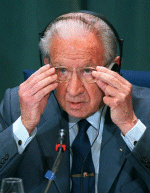Olympic Scandal

Looking for information about the 2006 Winter Olympics in Turin? |
| Five-Ring Circus |
| Bribery scandal tarnishes Olympic gold |
by Gerry Brown |
 President Juan Antonio Samaranch. |
Scandal is nothing new to the Olympic Games, but the scope and intensity of the recent corruption charges are. Allegations of vote buying first surfaced Dec. 12, 1998, involving Salt Lake City's winning bid for the 2002 Winter Games.
Members of Salt Lake's bid committee are accused of spending millions of dollars to improperly influence the votes of 14 International Olympic Committee members. The payments reportedly include cash payoffs, medical expenses, travel expenses, gifts, entertainment and college tuition payments for IOC members' children.
Six IOC members have already been booted and three more have resigned. Still three others are currently under investigation and a fourth has been given a warning. While it is unlikely that any actual criminal activity took place, the decision by several IOC members to accept lavish gifts and money was certainly unethical. It is difficult to determine whether votes were actually bought because the committee votes to award the Games by secret ballot.
The six members that have been preliminarily expelled are Jean-Claude Ganga of The Republic of Congo, Agustin Arroyo of Ecuador, Zein El Abdin Ahmed Abdel Gadir of Sudan, Lamine Keita of Mali, Charles Mukora of Kenya and Sergio Santander of Chile. Mukora is the only one of the six thus far to resign rather than be expelled. IOC members Pirjo Haeggman of Finland, Bashir Mohammed Attarabulsi of Libya and David Sibandze of Swaziland have also resigned their posts in the wake of allegations.
IOC president Juan Antonio Samaranch, though under pressure to step down due to the widening scandal, has ruled out resigning and has pledged to lead the effort in purging the corruption. He has promised the formation of an ethics commission to review how the IOC members operate. Changes are already in place for the 2006 Winter Olympics, the next games to be awarded. In a trial run for future selections, the city will be chosen by a panel made up of eight IOC members, three athletes, one winter sports representative, one national Olympic official, the IOC's longest serving member and the chairman of the 2006 evaluation commission.
| RELATED LINKS |
| Olympics Overview Olympic Reforms Olympics Through the Years |
Investigations of the Salt Lake situation by five different organizations (The FBI, the Justice Department, the USOC, the Utah attorney general and the Salt Lake ethics committee) are ongoing. Allegations of misconduct surrounding the 2000 Summer Games in Sydney have surfaced as well recently and the IOC has announced it plans to investigate all the Olympic sites from 1996 on. Many other unsuccessful bid sites have come forward and substantiated the claims that excessively lavish treatment was expected and most often received by IOC members. Things like free helicopter rides, plastic surgery and shopping sprees for voting members were commonplace.
All of these corruption charges come following the public admission that East German female swimmers were pumped up on vast amounts of anabolic steroids in the 1970's and 80's. The United States Olympic Committee has asked the IOC to somehow compensate all the swimmers, including several Americans, who lost out on Olympic glory because of the chemically enhanced performances of the East Germans. Unfortunately for swimmers like Shirley Babashoff, who might easily have had a record five gold medals in 1972, there's not much that can be done to recapture the moment.
The recent scandal surrounding the Olympics is likely to get worse before it gets better so continue to follow the story to see what other details come to light. Samaranch has called a special IOC assembly for March 17-18 to formalize the pending expulsions and ratify the new site-selection procedures. Also, the first report from the committees is expected to be released within the next week.
